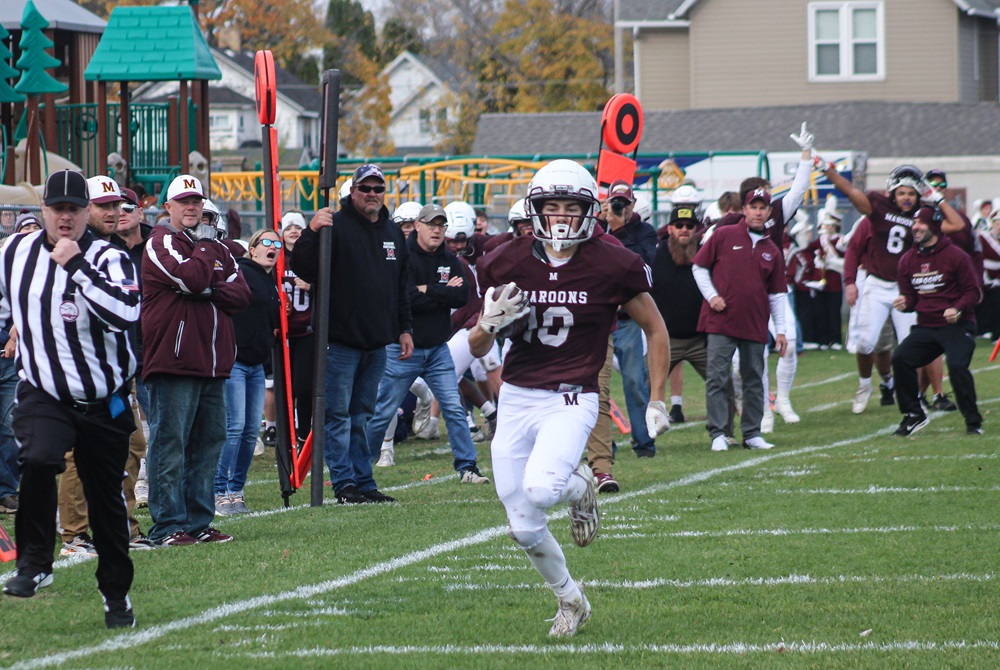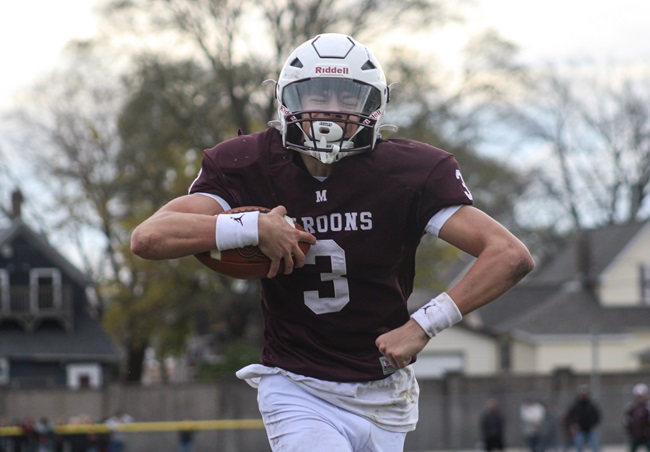
MHSA(Q&)A: Mendon football coach John Schwartz
February 2, 2012
 John Schwartz didn’t really want the Mendon football head coaching job when a group of players convinced him to take it before the 1989 season. And his first contract started out on a napkin. The rest is history.
John Schwartz didn’t really want the Mendon football head coaching job when a group of players convinced him to take it before the 1989 season. And his first contract started out on a napkin. The rest is history.
Mendon won its 11th MHSAA football championship this fall, downing Fowler 33-0 in the Division 8 Final, to tie for third-most football titles won by one program. Schwartz has coached in the program for all 11, including 10 as head coach, and his record of 236-39 gives him a winning percentage of .858, tops in the MHSAA record book. He recently was selected as this year’s recipient of the high school Duffy Daugherty Award, annually given for career contributions to the game. He follows recent winners Ralph Munger of Rockford and Herb Brogan of Jackson Lumen Christi.
His Mendon teams have had just one losing season. And although he retired a year ago after 36 teaching middle school science, and then fought off cancer over the summer, he has no plans to leave his post on the Hornets’ sideline.
How would you characterize your program?
I think we have very good coaches and I think the kids respect the coaches, and they know the coaches think more of them than just being football players. They care about them. We have their attention, and what we really try to do is form a team concept as soon as we can. We try to stay away from giving any one person too much recognition. We don't give out MVP awards at the end of the year. It's a program where we're all in it together: coaches, kids and community. We try to get the best out of the kids, give the kids the best shot we have at being the best we can be.
How does a small school continue to reload every season?
My first year there, the first thing I did as a head coach was I started the junior high program. I think that's where everything starts. We even have the younger kids called the rocket kids, and those coaches come in and talk about (football) terms so when kids move from one level to another there's no re-teaching. Everyone has an ego, coaches have egos, and they like to do some things differently. But we don't have that. They do what we do. We give them a lot of flexibility, but we have certain drills we want to run. By the time we get them, these kids are in tune with what we are doing. The summer program also is something I started my first year as head coach too. ... It means that during the season we can concentrate more on teaching than conditioning.
You went from 3-6 in 2006 to 12-0 in 2007. Explain how you bounced back.
The losing season we had, we didn't have a lot of kids, and our two best kids were hurt early in the season and couldn't play. We never did bounce back. Even in that season, we were ahead at halftime in all but one game. We just didn't have enough to come back and pull the game out, and we had some very tough games. It wasn't a good season, but I thought those kids played awfully hard for what we had. We got a lot of experience, and it paid off the following year.
Our JVs practice with the varsity. When I work with inside linebackers, I work with (grades) 9-12. Kids learn quicker from kids than from coaches, as far as I'm concerned. ... Football's really changed. It's become a lot more complex. I think we have to delegate more and more every year so we can stay with the changes. It's too much for one person. I remember my first three, four or five years it was just three of us at the varsity level. The other two, neither one taught at the school. We were pretty successful right off the bat, and we started getting more and more interest from people. Now 9-12 we have seven coaches, and we have three at the junior high, and all the coaches but two have played for me. They know what I expect, what I'm looking for, what I want. ... And they want to win. I'd be lost without those guys.
Are there certain seasons that have meant more than others?
The first year I took the job, in 1989, we went undefeated and won a state title. A lot of those kids are very good friends of mine yet, and they're pretty special to me. They were a big boost to my program. In the '95 year, my son was a sophomore on that state title team. I remember a lot about that team.
They all have something they did very well. They either threw the ball well or played great defense or had a big line. When I hear a year now, I think about those teams.
You grew up in a small town (Colon) and have taught and coached in a small town. Was that important for you to do?
I've never taught anywhere else. I never felt I really had a reason to leave. I've gone through at least six superintendents since I've been there. The fourth or fifth said to me, "The only thing that bothers me about Mendon is these people think an awful lot of winning. There are other things." He asked me, "How do you feel about it?" I said, if they didn't feel that way, I wouldn't be here.
Who was your biggest coaching influence?
I would say Morley (Fraser, Jr., under whom Schwartz was an assistant for three seasons). Years before I got there, Mendon was pretty good in the early 70s, and then in the mid 70s football wasn't very good. I was the JV coach the first year, and the second year after two games they brought me up to varsity. The best thing I did was I told them I would not take the head job, but I'll assist. I knew (Fraser) was the kind of person and personality we needed there. It wasn't necessarily all of his football knowledge, but his energy and excitement that he brought to the game.
You said during the Finals postgame press conference that you'd battled cancer during the summer. How did you come back, and did you ever think that might be time to step down?
Everything's fine. I had coaches that took over. At the same time that that happened, I was retiring. If you retire in Michigan, you can't be at the school for one month. So I couldn't be at summer weights all the way through June. So my coaches did all the summer weights. But I had no intention of stepping down. If something (bad) came down ... but once they said they got it, everything went as normal.
After a championship season, how do you ramp things back up for the next fall and a new group of players?
When we go to the playoffs, we take all the JVs unless there are couple who don't want to go. They experience that and get an extra five weeks of practice if we win a state title. And they're excited about it. They want to do that. They’ve' tasted it, and they want a part of that the next year. We remind them it's not what you did, it's what can you do for me now. ... This is your year.
We talk about winning state championships from day one. A lot of people say we shouldn't do that, but why not? Isn't that the ultimate goal? I can't imagine telling a team we think we could be 7-2 this year. We expect to be 9-0 every year. Of course, that's not going to happen. But at same time, I think the losses make you better the following week. We've won state titles where we haven't won the league title. ... You get better.
PHOTO: Mendon coach John Schwartz talks things over with his players during the Hornets' 21-14 win over Decatur in the 2002 Division 7 Final at the Pontiac Silverdome.


Playoff Experience Paying Off as Menominee Pursues Return Trip to Ford Field
By
John Vrancic
Special for MHSAA.com
November 14, 2024
MENOMINEE – Survive and advance.
 The Menominee Maroons did just that Saturday as they escaped with a 35-32 overtime football triumph over the Traverse City St. Francis Gladiators in a Division 7 District Final.
The Menominee Maroons did just that Saturday as they escaped with a 35-32 overtime football triumph over the Traverse City St. Francis Gladiators in a Division 7 District Final.
Menominee sealed the verdict on junior quarterback Tanner Theuerkauf’s seven-yard scoring pass to junior Dawson Bardowski, helping the Maroons (10-1) move a step closer to what they hope will be a return visit to the Finals later this month.
They host North Muskegon (10-1) in Saturday’s Regional Final at noon (CST) – and defeated North Muskegon 32-21 in a Semifinal last season to book their trip to Detroit. Menominee eventually finished last fall as Division 7 runner-up, dropping a 34-30 decision to Jackson Lumen Christi at Ford Field.
But the Maroons have stormed back, thus far improving on their performance from 2023. Their only loss this time has been 13-12 to Division 5 Kingsford in Week 8, and even after St. Francis scored 32 points, Menominee is still giving up only 9.8 per game – and scoring 45.5 per contest, making for an average margin of victory about six points more than this time a year ago.
On Saturday, Menominee trailed 14-0 after St. Francis’ first two possessions but took a 21-17 lead into halftime thanks to a 35-yard interception return by junior defensive back Landen Daigneau with 17 seconds left before the break.
“I’m very proud and excited,” Menominee coach Chad Brandt said after the St. Francis win. “They had a very good football team. Going down by 14 points is not recommended. Our guys missed some assignments, and they got a jump on us.
 “I’m proud of our guys for being resilient. That’s a great football team we beat and I just love the way the guys battled until the final play. The kids will never forget playing in this game, and the fans will not forget being at this game. Their fortitude and will to win were the keys.”
“I’m proud of our guys for being resilient. That’s a great football team we beat and I just love the way the guys battled until the final play. The kids will never forget playing in this game, and the fans will not forget being at this game. Their fortitude and will to win were the keys.”
The Maroons led late before St. Francis forced overtime with a touchdown with 22 seconds left in regulation. The Gladiators then scored first in overtime on a 21-yard field goal, before Bardowski hauled in the game-winner.
“Holding them to three in the overtime was huge,” Theuerkauf said. “That opened things up for us.
“The effort we gave today was unbelievable. That has been our strength all year. We had our backs against the wall, but knew we couldn’t give up. Our defense did a great job. Lot of our guys have been in big games. We knew what we had to do.”
Theuerkauf gained valuable experience last season as the top receiver for older brother Trevor Theuerkauf, now playing at Northern Michigan. Tanner also was a starting defensive back last fall, as was Bardowski.
Senior offensive lineman Lucas Thoune also was part of the starting lineup last season at Ford Field. His Saturday included snagging his first varsity reception – a 13-yarder off a deflection during the second quarter that helped set up a scoring run two plays later.
“That was a heads-up play,” he said. “You just do what’s got to be done. It’s exciting. We’re here for each other.
“I think last year’s run helped us out. I’m willing to be a play-maker for Menominee 10 times out of 10. I’ll never stop being the player I can be. I’m going to do everything I can while I can. I love this team. I love this sport. I don’t know what I’d do without Menominee football.”
The Maroons finished with 318 yards in total offense against the Gladiators. Theuerkauf hit 6-of-14 passes for 76 yards, two touchdowns and an interception. Sophomore Dylan Beal, who filled in after Theuerkauf was shaken up on a play in the third quarter, completed both of his passes for 56. Bardowski caught four for 79 yards and a TD, and junior running back Clayton Miller gained 87 on 16 carries.
 John Vrancic has covered high school sports in the Upper Peninsula since joining the Escanaba Daily Press staff in 1985. He is known most prominently across the peninsula for his extensive coverage of cross country and track & field that frequently appears in newspapers from the Wisconsin border to Lake Huron. He received the James Trethewey Award for Distinguished Service in 2015 from the Upper Peninsula Sportswriters and Sportscasters Association.
John Vrancic has covered high school sports in the Upper Peninsula since joining the Escanaba Daily Press staff in 1985. He is known most prominently across the peninsula for his extensive coverage of cross country and track & field that frequently appears in newspapers from the Wisconsin border to Lake Huron. He received the James Trethewey Award for Distinguished Service in 2015 from the Upper Peninsula Sportswriters and Sportscasters Association.
PHOTOS (Top) Menominee junior Landen Daigneau returns an interception for a touchdown during Saturday’s District championship game against Traverse City St Francis. (Middle) Menominee junior Tanner Theuerkauf celebrates a touchdown against the Gladiators. (Photos by Mitch Vosburg/Escanaba Daily Press.)

